The Fencing Club, Underground Gun Range, and WW2: An Interview with Country Day’s Eldest Alum, 97-Year-Old Mr. Corny Hauck
October 20, 2022
On Sunday, October 9th, I had the pleasure of sitting down for an interview with Mr. Corny Hauck. About two weeks prior, I had first seen Mr. Hauck at the alumni breakfast hosted by Country Day. As he walked by, I noticed that his name tag indicated that he was a member of the Class of ’43. I instantly thought of how interesting it would be to get his perspective on being a high school student at such a tumultuous period in history. After exchanging some emails with Mr. Hauck’s son, Tom, and calling Mr. Hauck himself a few times, I finally had an interview scheduled. Having a conversation with the most senior alumnus of Country Day has long been a hope of mine. I was thrilled to finally have it lined up. I walked into the Kenwood Senior Star senior living community asking for Mr. Hauck. The two women at the front desk not only knew who he was, but one of them had helped to take care of him
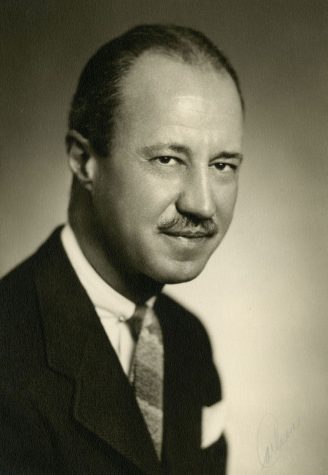
for a few years. She gladly showed me to his room.
Mr. Hauck welcomed me with a firm handshake and invited me to sit anywhere I’d like. Once I did, I asked him when he was born. “Cinco de Mayo!” he said. “Easy to remember.” Cornelius Wesche Hauck was born on May 5th, 1925, in the Clifton neighborhood to Mr. Cornelius J. Hauck and Mrs. Harriet Wesche Hauck. His family history runs deep in Cincinnati. His father, Cornelius, owned an estate in Cincinnati that he deeded to the city at the time of his death. “Sooty Acres,” as it is now known, is ensconced in the Hauck Botanical Gardens, all property donated to Cincinnati by his father. He also left the Cincinnati Historical Society with hundreds of rare books on botany with some dating as far back as 1419.
Mr. Hauck’s great-grandfather, John Hauck, was a German immigrant who founded the John Hauck Brewing Company in Over-the-Rhine. He was also the principal owner of the Cincinnati Red Stockings for a period in the 1880s.
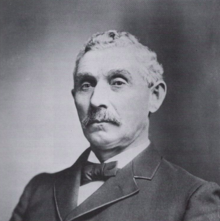
Before coming to Country Day in 7th grade, Mr. Hauck attended the Lotspeich School, now the lower school at Seven Hills. According to Mr. Hauck, Mrs. Lotspeich founded the school in her home in the early 20s. He described her as “not just a large lady, she was kind of dominating. She could take on any wrestler you ever saw! She was very positive, a great disciplinarian.” Despite a bus service to the Lotspeich School, Mrs. Lotspeich herself would drive around picking up students about three times a year when the bus could not get them. She drove a seven-passenger 1929 Franklin Sedan. “It was square, it was big, and air cooled,” he said. A self-described “car nut,” Mr. Hauck “figured these new ’33 Chryslers were pretty hot” and were “well designed cars,” and suggested that she turn her Franklin in for a new Chrysler. He recalled that she then remarked to him, “Oh Cornelius, I can’t do that, this is the only car I can fit into!”
Mr. Hauck then arrived at Country Day in 1937 for 7th and 8th grade before advancing to the high school as a freshman with his class of 21 students in 1939. One activity he particularly enjoyed was the Country Day fencing club. During his junior and senior year, he and his friends joined the club to practice their skills. Their fencing instructor, according to Mr. Hauck, “was a, what you’d expect, a really ancient old Frenchman.” After hours of practice, Mr. Hauck told me that he “had had a contest with some other fencing group, and me and my buddy Steve Marvin, both of us were the main fencing people at the school.” After the competition, pictures were taken of Steve and Corny, who had won the competition. Those pictures were then taken to the sports editor of the now-defunct Cincinnati Times-Star. Founded through a merger of smaller newspapers in 1880 by Charles Phelps Taft, William Howard Taft’s half-brother, the Times-Star ran until it was shuttered in 1958. Mr. Hauck told me that the Times-Star’s sports editor, Nixson Denton, a “crusty old character” who’d “growl at ya” pointed at him in the picture and insulted him. He regrets that he “never thought of any good way to get back at him.”
On December 7th, 1941, during Mr. Hauck’s junior year, life in America changed forever. Imperial Japan launched a surprise attack on Pearl Harbor, Hawaii. The United States formally entered the war the following day. I asked Mr. Hauck how it felt to be a high school student during this period in history. He said, “You didn’t live in a different atmosphere yet, that didn’t come until after the Japanese. By that time, they were drafting us anyway, so I got a draft notice when I turned 18, and I said, well I guess I’m gonna go.” Herbert Snyder, Head of School for twelve years at the outbreak of the war, whom Mr. Hauck declared had “ruled the place with an iron hand,” was called back into the service as a major. Mr. Hauck explained that Harwood Ellis, Herbet Snyder’s successor, “was a nice guy. He said, well, when you get out of the service there’s going to be thousands of guys like you who are wanting to go to college. He said, you’ve got some time ‘til you have to report. Put in for a school that would be acceptable. I said, well I don’t know of any colleges I want to go to.” He would eventually decide to attend Williams College in northeastern Massachusetts.
Before he could head to college, however, he would have to report to Columbus for an inspection for the draft. “When I got there, they said, well we don’t need you, you’re too light. We want the big tough types. I was, at that point, about 6’1 and weighed about one hundred and twelve or fifteen pounds. Lotta bone too, I mean my bones are good!” His good bones and low weight kept him out of the draft for two years while he studied economic theory at Williams. By 1945, however, he got another call from Columbus. “I think you’re warm, kid, to get in,” they said, and with that, Mr. Hauck was off to Camp Joseph T. Robinson in Little Rock, Arkansas for basic training. I asked how he would describe his experience in basic training. “It wasn’t bad at all,” he said. “We got to about the fourth week, and that’s when they try and teach you dumb kids what a gun is and how ya handle the rifle and whatcha do with it!” Thankfully, Mr. Hauck had some previous experience with firearms. “I already learned at Country Day! We had a rifle range in the basement of the primary building. My pal Steve Marvin and I had got to be pretty good crack shots!” Not only were Corny Hauck and Steve Marvin the best fencers at Country Day, but the best shots too? I’m sure they would have been fun to watch. Mr. Hauck spoke highly of a tri-state shooting competition that was held his senior year. “They had a contest, I guess statewide, it was Ohio, Indiana, and Kentucky, contest for the best sharpshooter among the high school students. Well, Steve did great. He made how to do a prone, or kneeling, which I like, or offhand, and then you have twenty targets on each. He did a great job, he hit nineteen out of twenty in one, twenty outta twenty on another, twenty outta twenty on the third.” “How about you, how’d you do,” I asked? “I hit twenty in all of ‘em!”
By week four of his training, Mr. Hauck was thriving. He was the “captain’s favorite” who “could show all the guys how to do it. [He] was the hero for the moment.” By week six, the honeymoon was over. After constant marching and drilling, “the army’s rebuilding process of my physique had got me down to 104 pounds and this doctor says well, we’ve got an absolute minimum, a requirement in the army of 105 pounds and you don’t make the minimum! So then the doc calls my captain and asks what are we gonna do with this guy?” The army decided that his job would be to map soldiers’ routes to the West Coast to be shipped to the Pacific. “Somebody had to figure out each guy, what route he could take and how long it was going to take him to get to the West Coast, including going home first. We would ask the kid and say, where’s the railroad station nearest to you? Because everything was being done by rail then. I was staying up all night sometimes because you had to keep track of each one of them!”
When the war ended on September 2nd, 1945, he returned to Williams to finish studying economic theory. Mr. Hauck explained that “I found when I got to Williams that a lot of the kids there were from the New York area, maybe Boston, and these kids, they’ve been to good high schools. The equivalent of Walnut Hills. Still, they had a hard time adjusting to real, tough college stuff.” Thankfully for him, however, it wasn’t as difficult of an adjustment. “I didn’t have any trouble! I was fine, which I thought was a good example of what it pays to go to a really good school like Country Day. If it’s still as it was then, it is a good school, and that pays.” I found it striking that even a graduate from 80 years ago felt like the Country Day experience set him ahead of other students when he finally arrived at college.
After graduating from Williams, Mr. Hauck got a job at a print advertising agency in 1948. He then married his wife, Janet, on June 24th, 1950, in Cincinnati. He had three children with her, John W. Hauck, CCDS ’69, Thomas Hauck, CCDS ’72, and Amy W. Hauck, Hillsdale School, now Seven Hills, ’71. They were married for 71 years before she passed away on May 21st, 2022, at the age of 93.
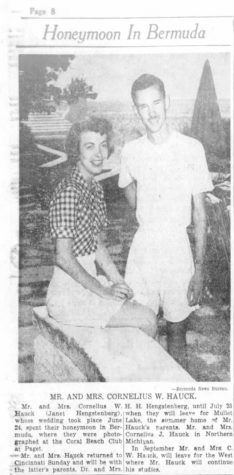
After he got married, he left to study at the University of Arizona. Upon his return to Cincinnati, he worked for seventeen years at another advertising agency, before becoming interested in investing. He explained to me that, “finally one day, one of the managing partners in a local firm that I did business with, he said Cornelius, why don’t you come here and work with us! You know more about this stuff than these guys we got working here now!” He worked as an investment advisor for 42 years before retiring. In his retirement, Mr. Hauck kept busy through pursuing his passion for locomotives. He’s written multiple books on the railroad in Ohio and the West and was a founding member and trustee of the Colorado Railroad Museum.
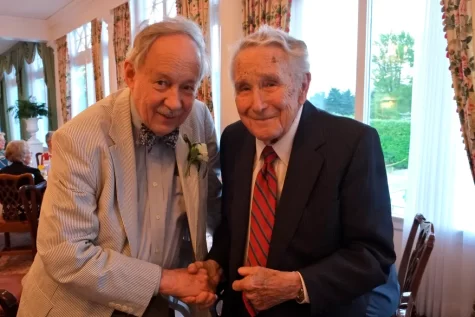
I finished by asking Mr. Hauck what it felt like to watch his friends go off to war at such a formative age. “Well, we were all doing it!” he told me. “So it was just kind of a part of life then,” I asked? “Yes, that’s right,” he said. I think that one thing that is lost on most of us students during history class is that major global conflicts such as the World Wars were not alien events that happened thousands of miles away. These conflicts affected every aspect of society, down to even Cincinnati Country Day, our school that is still in operation. The men and women that fought and won World War Two, whether on the home front like Mr. Hauck, or in the battles that we learn about in history class such as the Bulge, D-Day, Midway, Monte Cassino and others didn’t come from faraway places. They came from Cincinnati, Loveland, Milford, Madeira, and Indian Hill. They came from our own campus. These major historical events weren’t, relatively, even that long ago. I will graduate in 2023, exactly 80 years after Mr. Hauck. At my age, it would have been a Civil War veteran who had graduated 80 years before him in 1863.
Robert Pogue, a member of the Cincinnati Country Day School Class of ’43, the same as Mr. Hauck, gave his life for our country during World War Two. Had he not been killed, he may have lived long enough for me to interview him for this article. It is of the utmost importance that we never take the peacetime that we enjoy for granted and that we always honor the sacrifices that men like Mr. Hauck and the members of his Class made not so long ago.



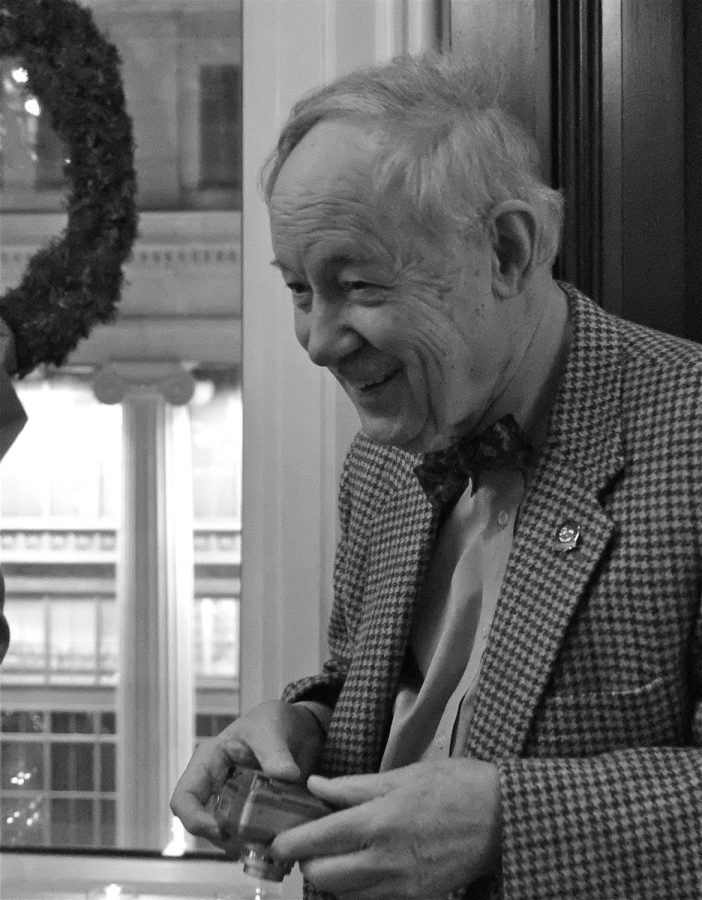
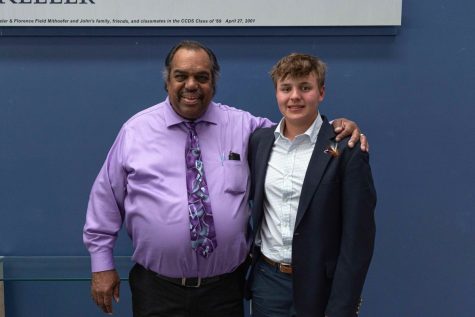
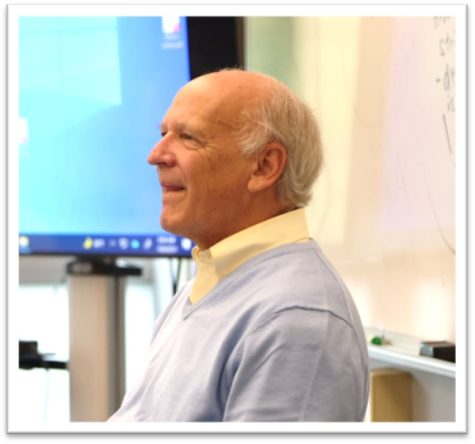
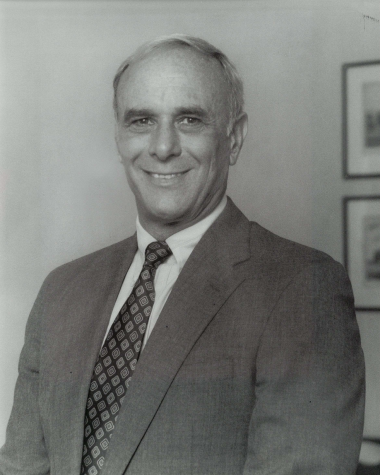
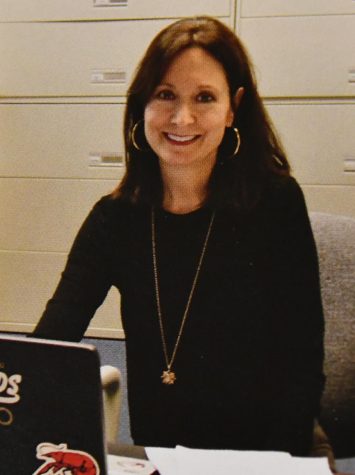
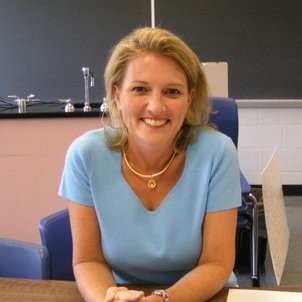





John W. Hauck • Oct 22, 2022 at 3:58 pm
Very nice interview, as Brock said yesterday. I am Corny Hauck’s eldest son, and the family is thankful to have Corny as our patriarch at age 97. Still vibrant, witty, and sharp as a tack. I am glad to know the Scroll is reaching out to members of all ages in the school community!
I will add one little comment that Corny always jokes about. Before and/or during World War II most of the class of ’43 went off either to boarding school or to the military. Dad mentions Steve Marvin in the article. Dad and Steve were the only remaining class members actually to graduate from CCDS in ’43. The class was down to only two students! Steve was pretty smart, and he went off to the Naval Academy. Eventually he became a Captain and then a Rear Admiral. Thus Dad would joke that when it came to class rank — in terms of grades — Dad constituted the “entire lower half of the class of ’43.”
Brock Miller • Oct 21, 2022 at 9:33 am
Very nice interview! Good for you for finding him so that we could all hear his story. The effect of WWII on the young people of that era – people like my father and father-in-law – is hard to imagine now.